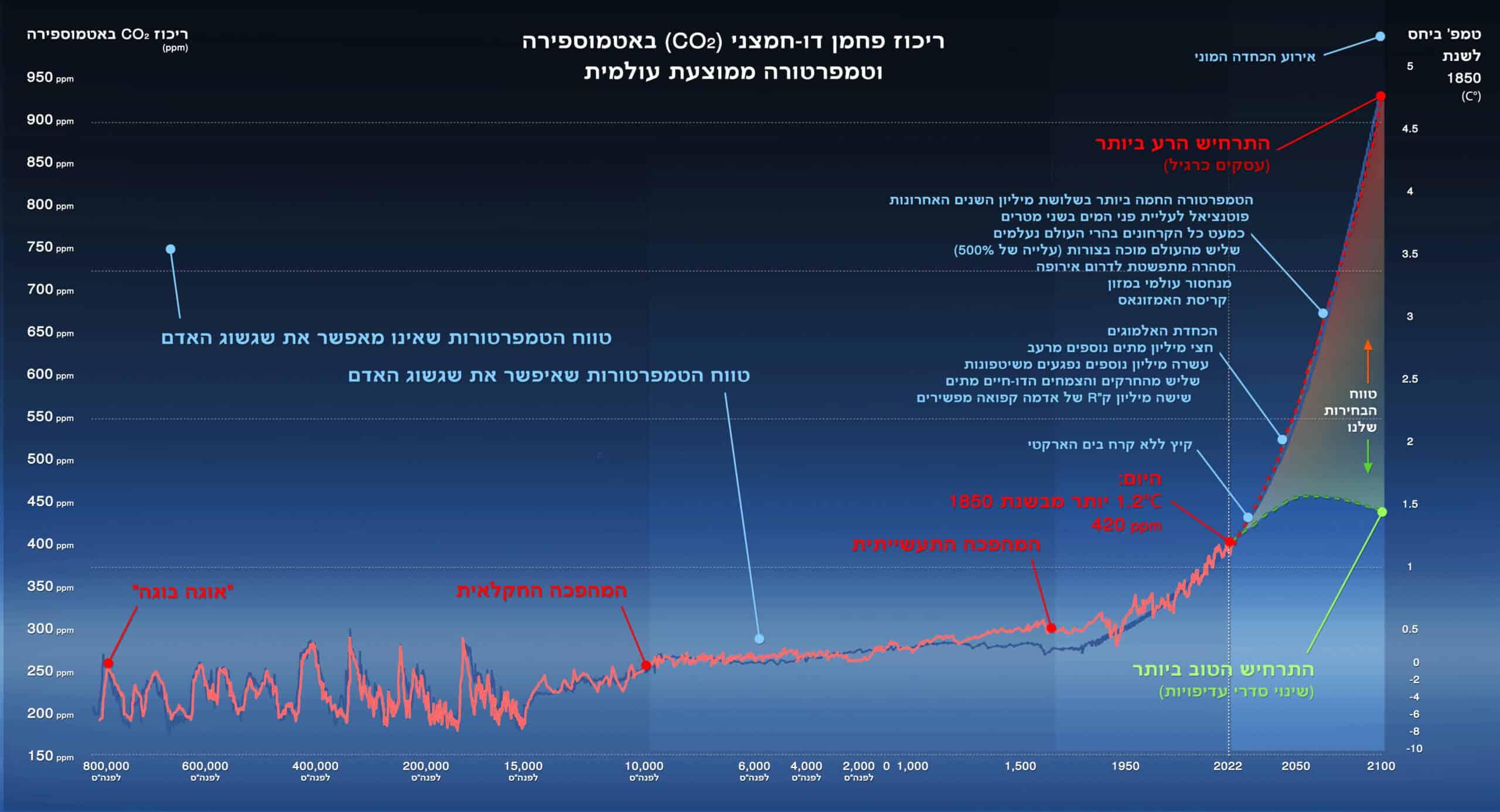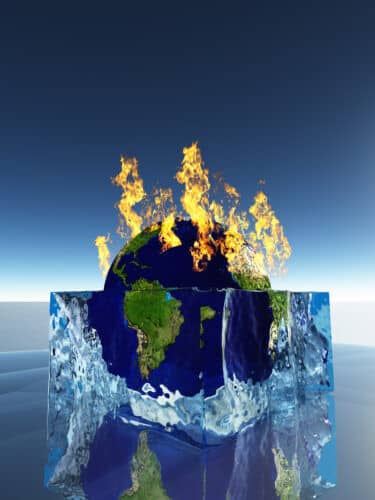The third part of the report published this week warns that if we do not drastically change the entire economy - transportation, construction, electricity generation, etc., we threaten future generations and even all life on Earth, write researchers who edited some of the chapters in the IPCC report

Authors:
- Thomas Weidman, Professor of Sustainability Studies, UNSW Sydney
- Arunmia Malik, Senior Lecturer in Sustainability, University of Sydney
- Glenn Peters, Research Director, Center for International Climate and Environmental Research - Oslo
- Jacqueline Peel, Director of the Climate Futures Division, University of Melbourne
- Shomai Bai, Professor, Australian National University
Translation: Avi Blizovsky
Six degrees of warming means the extinction of all life on Earth. We are currently at a growth rate of three degrees, which means we are halfway to mass extinction. This is perhaps the sentence that should be remembered from the third part of the International Panel on Climate Change (IPCC) report that was published yesterday.
The world still has the best chance of reducing greenhouse gas emissions quickly, but hard and fast cuts are needed in all sectors and countries to keep warming at safe levels, the IPCC says.
The report of the Intergovernmental Panel on Climate Change (IPCC), published this week, states that the opportunities for reasonable reductions in global emissions have increased sharply since the last such assessment in 2014, but the need to act has also become much more urgent. The 278 authors of the report reviewed approximately 18 scientific articles and came to the conclusion that in order to succeed in the task, dramatic changes in our conduct will be required.
The report is a final assessment of the level of activity that humanity performs to find a solution to the rise in temperatures. Here we explain key aspects of the findings and what they mean for the world.
Glenn Peters, lead author of the chapter on Action Tracks to Stop Global Warming that are Compatible with Long-Term Goals:
The report reveals that the world has made progress in reducing emissions in the last decade. Growth in greenhouse gas emissions slowed to 1.3% per year in the 2010s, compared to 2.1% in the 2000s, but global emissions are still high. If the ambition of the decision makers does not increase immediately, warming by the end of the century will rise beyond 1.5 degrees Celsius and will be on the way to 2 degrees Celsius, meaning that the temperature goals of the Paris Agreement will not be met.

Worryingly, current policies already put us on a path to warming of between 2.2 and 3.5 degrees within eighty years. This is much better than the 4°C or more we feared a decade ago, but is still far from being in line with the Paris Agreement.
To have a 50% chance of limiting global warming to 1.5°C by the end of the century, global carbon dioxide emissions must be reduced within a decade, reaching net zero in 2050 and becoming net negative thereafter. Methane emissions would also have to be halved by 2050 under these scenarios.
Halving global emissions by 2030 is a doable task, the IPCC report's editors write, but it requires an immediate change in climate policy across all sectors, countries and levels of government. Rich countries must make the fastest emission reductions.
More than technology
Tommy Weidman, lead author of the chapter on emission trends: "The report is a comprehensive catalog of what can be done - but mostly hasn't been done yet - to prevent catastrophic climate change."
"There are encouraging trends. About 36 countries have successfully reduced greenhouse gas emissions for more than a decade. The opportunities to reduce emissions at a reasonable cost have greatly doubled since 2014, the report shows. This is mainly due to the drop in the costs of renewable energies, which guarantee a reduction in emissions beyond the energy sector in areas such as production and heavy transportation. We are expanding the options here.”
But change is not coming fast enough. The report confirms that all the energy efficiency gains in the last decade have exceeded economic growth and population growth, but technology is not a silver bullet. To have any chance of halving global emissions by 2030, we must use fewer carbon-intensive products and adopt a low-emission lifestyle. Like all other required changes, these cannot be incremental, the IPCC says.
Aaronmia Malik, the lead author of the introduction and framing chapter of the IPCC report: In 2016, the Sustainable Development Goals of the United Nations came into force - an action plan for people, planets and prosperity. Sustainable development meets the needs of the present without compromising future generations. And as the latest IPCC report emphasizes, it cannot be achieved without effective climate action.
One Sustainable Development Goal specifically focuses on tackling climate change. But it is necessary to act in the fields of energy, cities, industry, land, water and people. The emission reduction policy must be inclusive and avoid unintended consequences such as worsening poverty and hunger. The transition to a low-carbon world should be equitable and leave no one behind.
The IPCC report calls for both accelerated climate action and a just transition. This requires well-planned policies at all levels of government, and in all sectors. International cooperation is key.
International cooperation
Jacqueline Peel, lead author of the international cooperation chapter of the IPCC report:
This report is the first to assess the results of the implementation of the Paris Agreement, which entered into force in 2020. Within the framework of the agreement, countries submit and update commitments to reduce emissions and adapt to the changing climate.
For these commitments to be met globally, high-income countries must help other countries by providing financing, access to clean energy technologies, and other assistance and know-how. The IPCC has identified a lack of funding to deal with the climate crisis. In particular, high-income countries missed their 2020 target of raising $100 billion a year.
The Paris Agreement is an agreement, but the implementation was voluntary - countries set themselves goals and cannot be forced to comply with them. So, does it work? According to this new report, progress is great but very slow. It also increased transparency, allowing outside civil society groups to assess countries' progress.
Other international mechanisms, such as global business partnerships and youth climate protests, are also driving change. But more must be done to reduce emissions in this half decade.
Shomai Bai, the main author of the chapter that dealt with urban systems: "The IPCC report found that about 70% of the world's greenhouse gas emissions are produced in cities and urban areas. This figure raises challenges but also raises opportunities to reduce emissions. So far, more than 1,000 cities around the world have signed up to net zero emissions goals.”
"To fulfill the Paris Agreement, more cities must step up and work towards goals such as 100% renewable energy, carbon-free transportation, green construction and improved waste management. The developing countries are undergoing accelerated urbanization, which requires new housing and infrastructure. But construction in the way of business as usual could lead to a significant increase in carbon emissions, the IPCC warns.
Mayors must adopt integrated planning and management to meet the climate challenge while cities continue their important role in maintaining social, economic and environmental well-being. Everyone should participate: businesses, communities, researchers and citizens."
The latest report shows how the choices we make now will determine the fate of future generations - and all life on Earth.
Humanity has already missed so many opportunities to stabilize the Earth's climate. Now we have a chance to right some of those past wrongs. Only an urgent and coordinated effort in all sectors and countries, starting today, will provide the necessary change.
For an article in The Conversation
More of the topic in Hayadan:
- Summary of the sixth IPCC climate report for decision makers. document
- Environmental food production
- The government decided to move Israel to a low-carbon economy by 2050
- There is a close connection between global warming and extreme weather events
- BI-U honey was able to express a cultured royal jelly food protein

4 תגובות
"A temperature increase of 5.2 °C above the pre-industrial level at present rates of increase would likely result in mass extinction comparable to that of the major Phanerozoic events"
nature.com/articles/s41467-021-25019-2
Moses
how is that related? We see the damages of climate change (but with you blind).
You're not blind, are you?
Indeed there have been six extinctions - the last one is in full swing now - the Anthropocene.
A warming of six degrees is extinction or intimidation?!
How many times in the last billion years was the average temperature more than six degrees higher than it is now?!
Data is for the weak?!